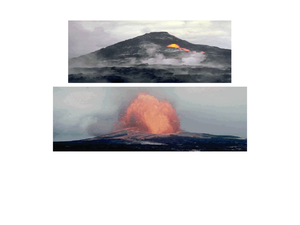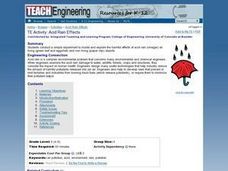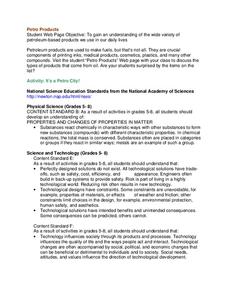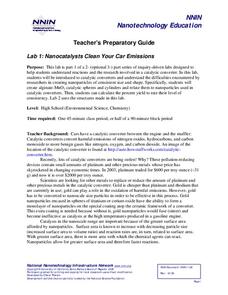Curated OER
Chemical Engineering: Volcanoes
Pupils study volcanoes using a chemical engineering project. In this volcanoes lesson plan, students create a model town and discuss the properties of a volcano. Pupils then make a volcano using a chemical engineering format for their...
Curated OER
Acid Rain Effects
Get out the goggles and conduct a simple experiment to model and explore the harmful effects of acid rain (vinegar) on living (green leaf and eggshell) and non-living (paper clip) objects. Young chemists observe and describe the harmful...
Bonneville
Researching Chemicals and Materials for Solar Cell Construction
Revolutionize the solar cell industry with a new design. The 10th of 14 lessons in the Cost Effective Solar Cells unit has pupils start a project in which they design a unique solar cell. They receive an introduction to the project,...
Teach Engineering
Clean it Up!
Harness the power of bacteria. Scholars see how using organisms that exist in nature can help solve human problems in the process known as bioremediation. They research and discuss several successful examples, such as using oil-eating...
Curated OER
Petro Products
In this petroleum products worksheet, students are given the components of crude oil and they graph the various products found in a 50 gallon barrel. Students complete an activity to determine if they have collected cards that represent...
Curated OER
Acid Attack
Pupils explore the effect of chemical erosion on statues and monuments. They use chalk to see what happens when limestone is placed in liquids with different pH values. They also discover several things that engineers are doing to reduce...
Curated OER
Chemical Engineer
Students identify toxic household products. In this ecology lesson, students research on the health effects, rating and disposal of these products. They rank them based on the danger they pose.
Beyond Benign
12 Principle Match Up
Can you find a match? Scholars review the 12 principles of green chemistry by playing a matching game. The second lesson of the series reinforces the principles from the first lesson. Individuals play the matching game and also complete...
Beyond Benign
Is It Easy Being Green Game Show
Is it possible to create an environmentally friendly shampoo? Learners accept this challenge in the fifth lesson in a green chemistry series of 24. The analysis of their shampoo ingredients must address pH, exothermic reactions, and...
DiscoverE
Clean It Up
Water, water, everywhere, but not a drop to drink—until we clean it, of course! Scholars design a filtration device that removes pollutants from water. The goal is to have the water come out as clean as possible from the device. How...
Bonneville
Unique Solar Cell Model Sketch and Presentation
There's always room for improvement. Continuing from the previous lesson, learners first create a two- or three-dimensional model of their solar cell designs. They then give short presentations to the rest of the class and receive...
Bonneville
Unique Solar Cell Construction and Testing
It's finally time to build. The 12th of 14 installments in the Cost Effective Solar Cells unit has future scientists construct their unique solar cells. They then test out the devices in various conditions and record the results.
Curated OER
TE Lesson: How Clean is that Water?
Middle schoolers examine the factors the affect water quality, and allow for animals and plants to live. They look at how engineers apply water quality information when making stream modifications in order to ensure drinking water...
Polar Trec
What Is My Footprint?
How do one's habits and lifestyle choices affect the environment? Through a short online survey, learners will calculate their own carbon footprints then determine how to reduce their impact on the environment through simple steps, such...
Curated OER
How Full is Full?
Students examine porosity and permeability and relate these concepts to groundwater flow. They use simple materials to conduct a porosity experiment and use the information to understand how environmental engineers decide on the...
Curated OER
Connection to Engineering: Fractions of Crude Oil
For this crude oil worksheet, learners read about the fractions of crude oil and their demand. They answer questions about the data given.
Cornell University
Fibers, Dyes, and the Environment
Nanofibers can be made through electrospinning or force spinning in order to reduce the negative impact on the environment. Pupils study the role of fibers and dye on the environment through a series of five hands-on activities. Then,...
Curated OER
Reduce, Reuse, Recycle and Compost
Students expand their understanding of solid waste management. They examine the effects of packaging decisions. They study engineering advancements in packaging materials and solid waste management.
Curated OER
TE Lesson: Pollution Solutions
Learners study how industrial technology helps clean up and prevent air pollution. They role play as engineers to examine methods of engineering pollutant recovery methods such as scrubbers, electrostatic precipitators, cyclones, and...
Teach Engineering
Energy Forms and States Demonstrations
Does a tennis ball have energy? What about a bowling ball? Demonstrate concepts of different forms of energy forms and states with a variety of objects. Using the equations for potential and kinetic energy, learners determine the amount...
Teach Engineering
Sugar Spill!
Sugar isn't good for you, but it's great for yeast! Scholars design an experiment to investigate how variables affect the rate of sugar consumption in yeast. The last installment of a nine-part Life Science unit considers how scientists...
Kenan Fellows
Making Connections with Water Quality
What's in your water? And, why is water quality so important? Enhance your class's level of water appreciation through a lesson that demonstrates the necessity of water quality. Environmental enthusiasts explore the EPA's Clean Water...
National Nanotechnology Infrastructure Network
Lab 1: Nanocatalysts Clean Your Car Emissions
What a big job for such a small particle. Young scientists learn about the role of nanoparticles in catalytic converters for cars. They conduct an experiment to create alginate-MnO2 catalytic spheres.
Curated OER
You Are What You Drink!
Students explore water treatment systems. In this water conservation ecology lesson, students identify and explain several processes used for water treatment and define related vocabulary after listening to content information given...
























